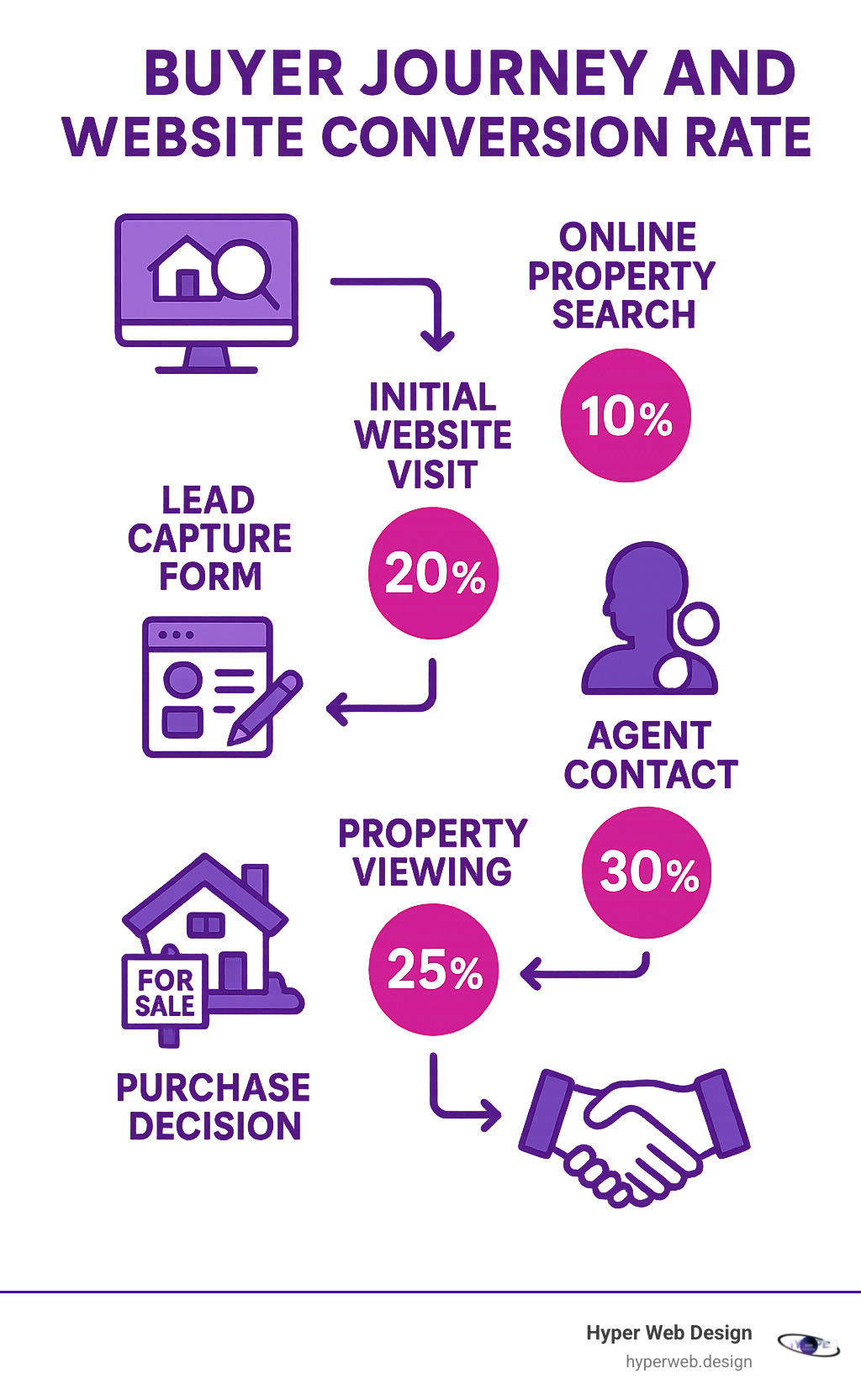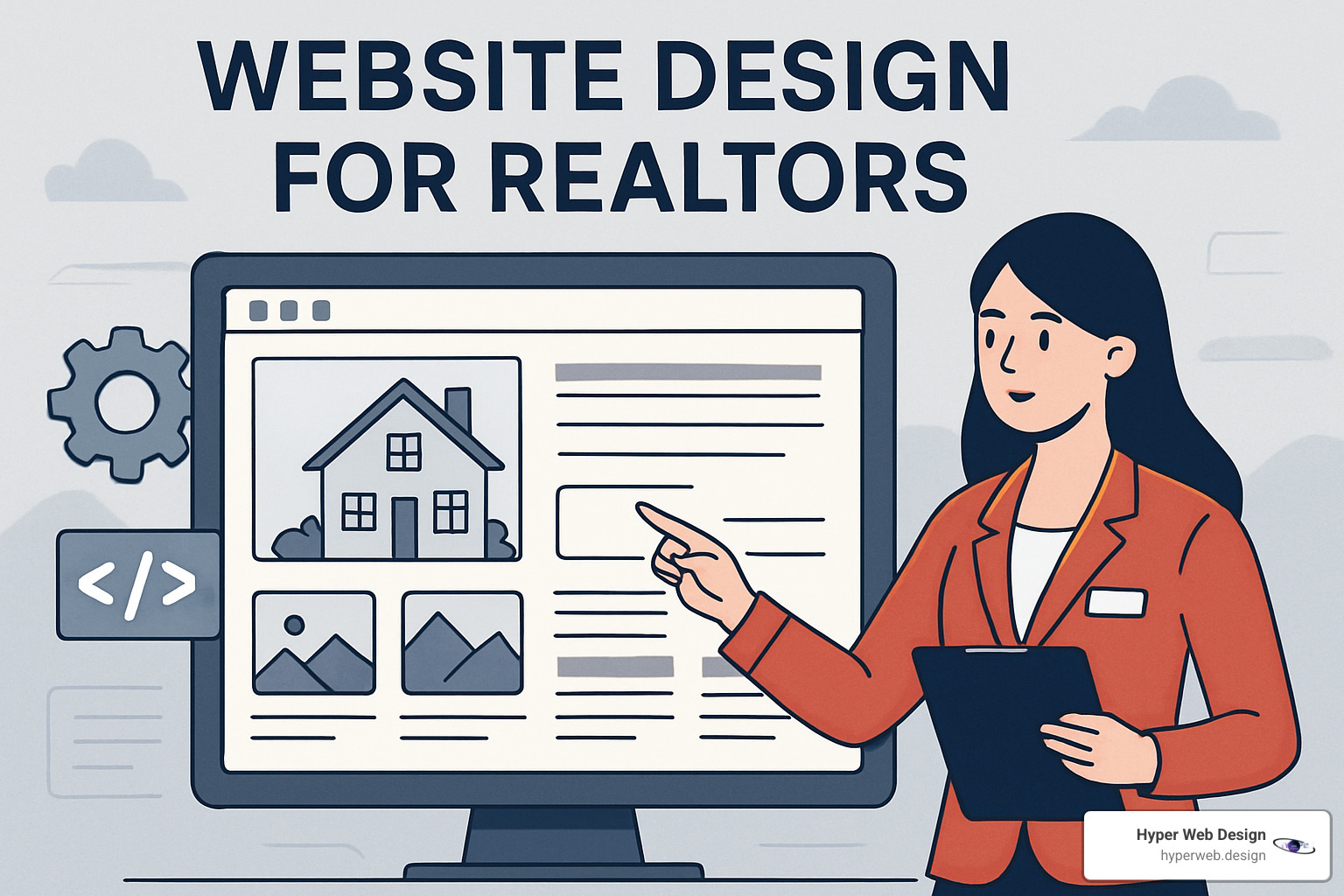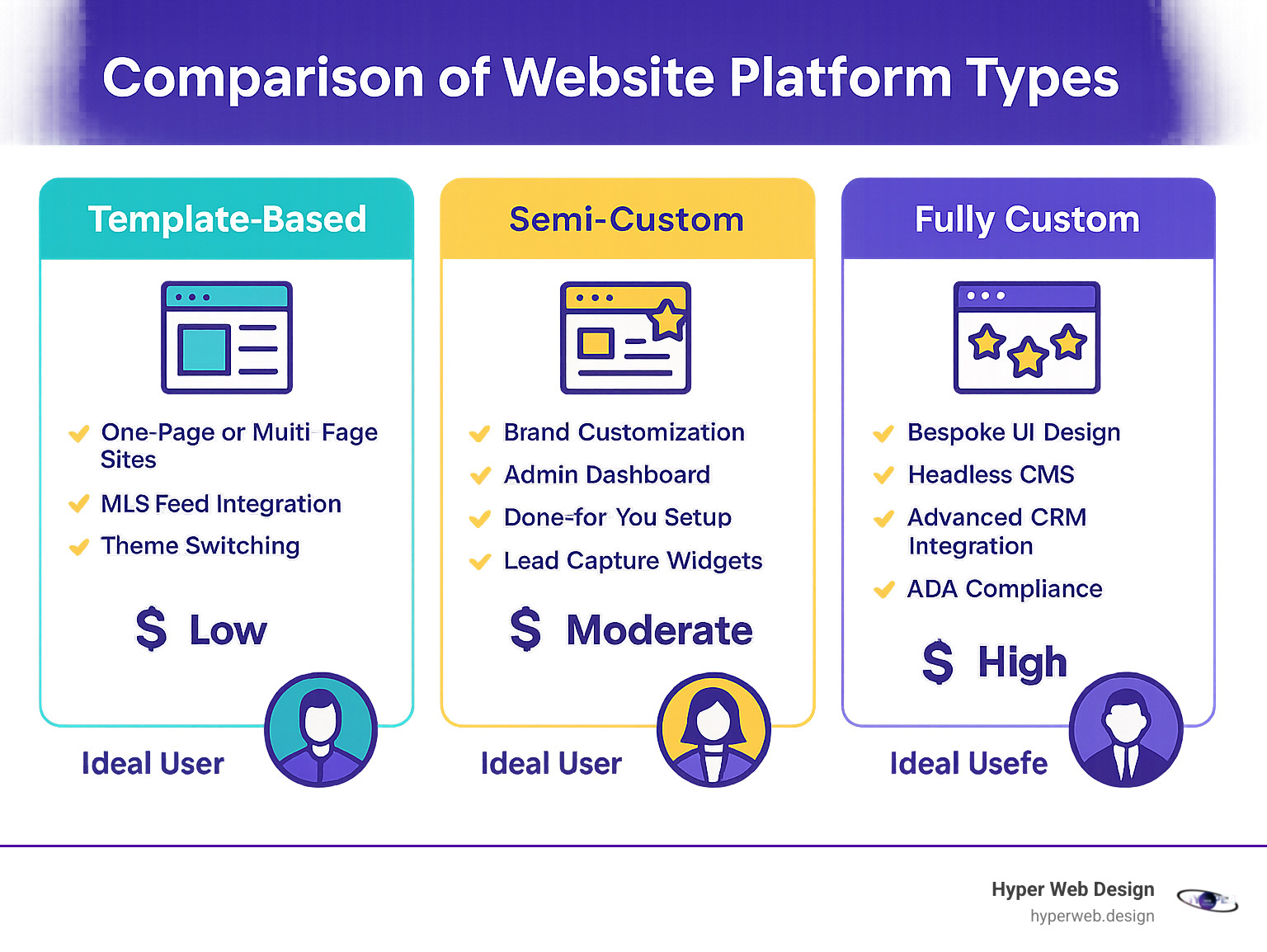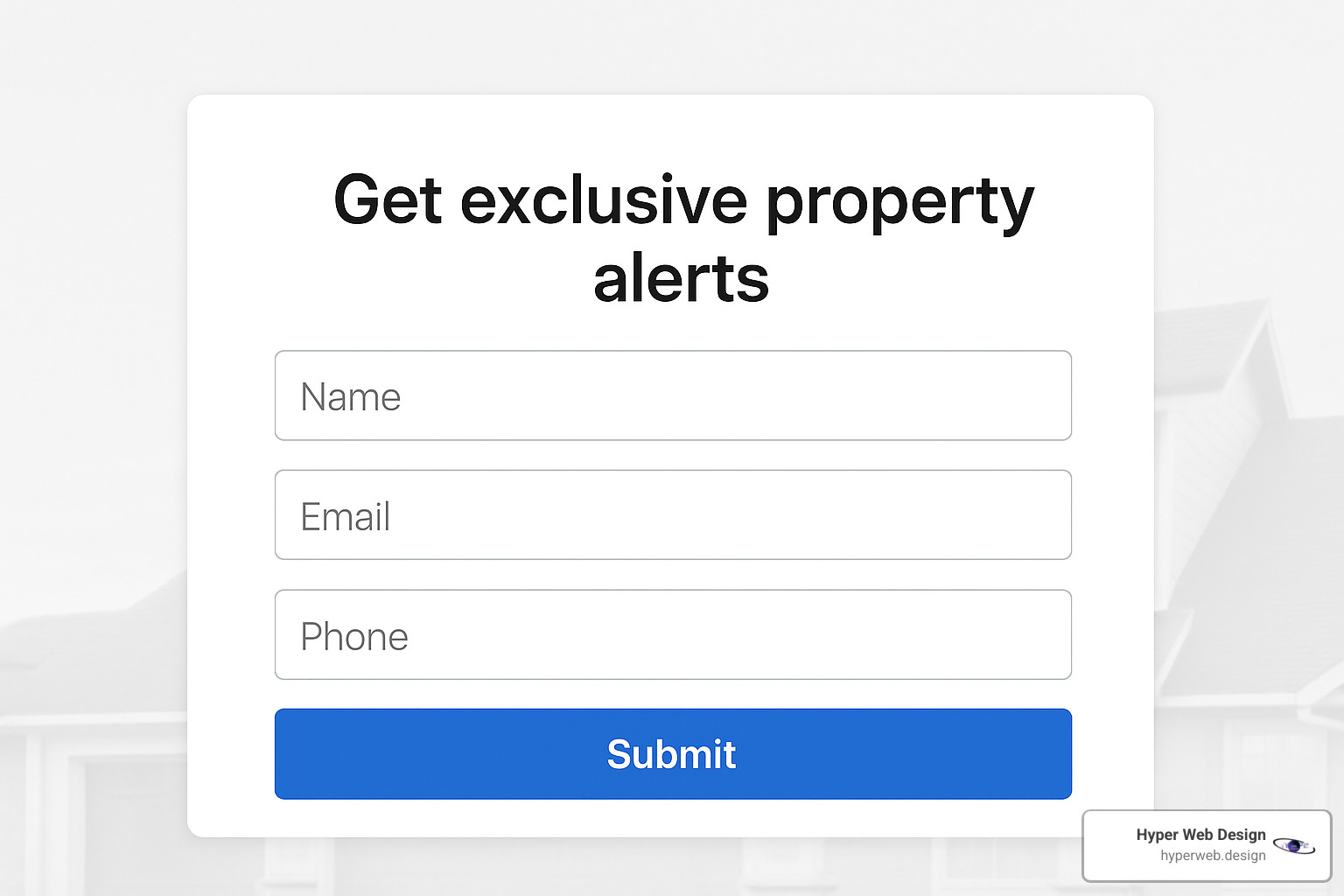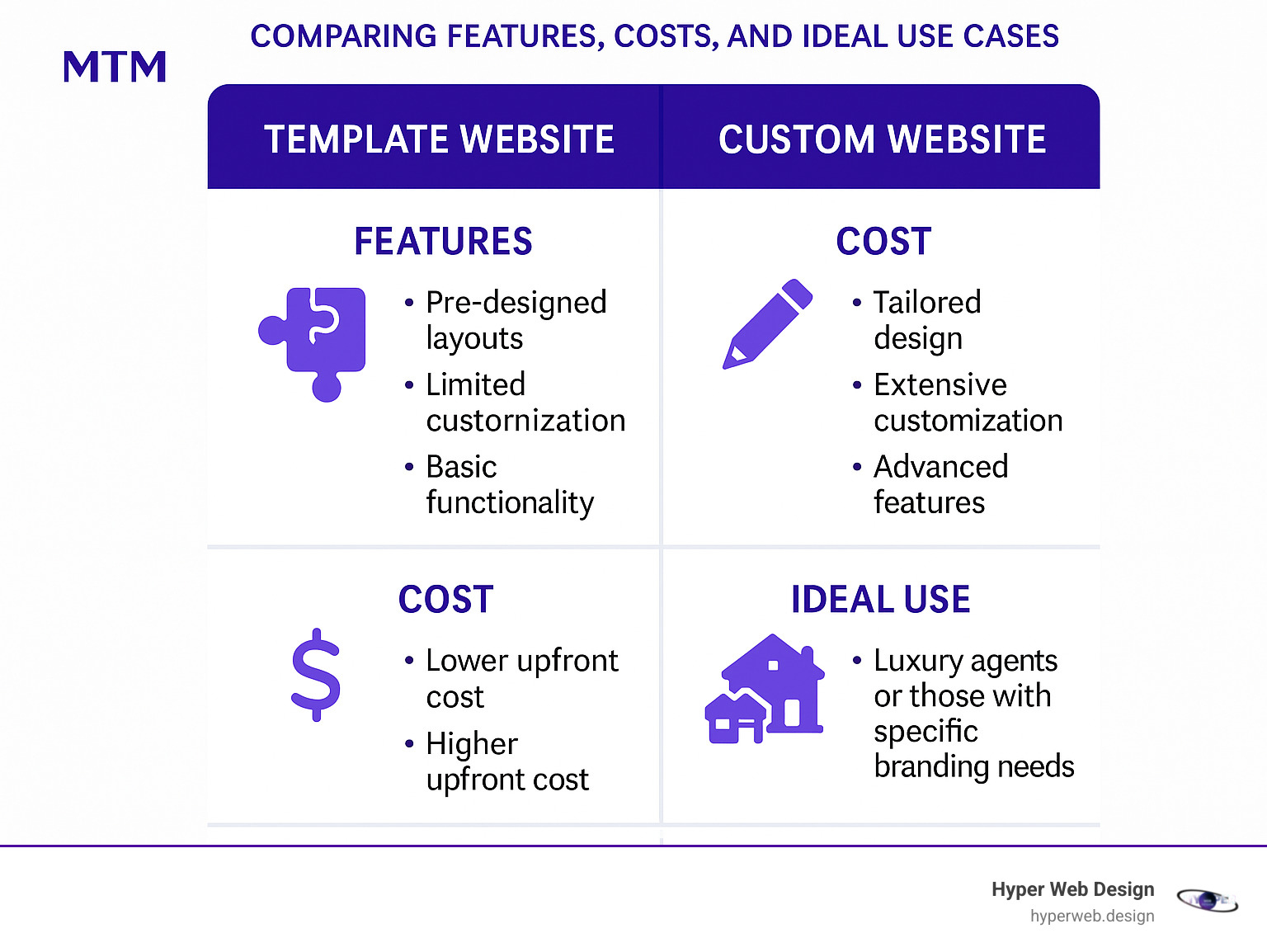Why Professional Website Design Makes or Breaks Real Estate Success
Website design for realtors isn’t just about looking good online – it’s about converting visitors into clients in an industry where 51% of homebuyers found their purchased home online first. Your website is often the first impression potential clients have of your business, and research shows people form that impression in just 0.05 seconds.
Top Website Design Platform Categories for Realtors:
- DIY Builders ($17-50/month) – Best for solo agents starting out
- Real Estate Specialists ($79-249/month) – Built-in IDX and lead capture
- Luxury Custom ($500-1500+ setup) – Premium branding for high-end markets
- Template Marketplaces ($29-129 one-time) – Flexible customization options
The stakes are high. With 81% of National Association of Realtors members listing properties on their websites and 70% of agents having an online presence, a poorly designed site can mean lost leads to competitors. Modern buyers expect seamless mobile experiences, instant property search, and clear contact paths.
Your website needs to do three things well: build trust instantly, showcase your local expertise, and capture leads effectively. Whether you’re a solo agent working luxury properties or part of a large brokerage, the right platform can transform your online presence from a digital business card into a lead-generating machine.
As Shawn Shameli, I’ve spent over a decade helping businesses create websites that balance visual appeal with technical performance, and I’ve seen how the right website design for realtors can dramatically increase conversion rates and establish market authority. Through my work at Hyper Web Design, I understand the unique challenges real estate professionals face when trying to stand out in an increasingly digital marketplace.
Snapshot of Modern Realtor Sites: Buyer Expectations & Design Trends
Your potential clients have gotten picky about websites – and for good reason. They’re used to scrolling through beautifully designed apps and websites all day, so when they land on your real estate site, they expect that same polished experience.
The biggest shift we’re seeing is toward visual-first design. Gone are the days when you could get away with tiny property photos and walls of text. Today’s buyers want to see stunning, high-resolution images the moment they hit your homepage.
Minimalism has taken over, but not the boring kind. We’re talking about clean, uncluttered layouts that let your property photos shine. White space isn’t wasted space – it’s what makes your listings look expensive and professional.
Video tours aren’t just nice to have anymore. Properties with video content get 403% more inquiries than those without. The most successful realtor sites embed virtual tours right into their listings.
Accessibility features are becoming essential, not just for compliance but for capturing every possible lead. Simple tools that adjust text size, improve contrast, or help people with dyslexia can mean the difference between a lost visitor and a new client.
Your IDX integration needs to be more than just a basic MLS feed. The best sites customize their property search with branded interfaces and smart features like saved searches. When someone can save their favorite listings and get automatic updates, they stay connected to your site.
Local SEO has gotten more sophisticated too. It’s not enough to just mention that you serve “Greater Metro Area.” Smart realtors create dedicated pages for each neighborhood, complete with market data, school ratings, and local insights.
The latest research on first-impressions backs up what we see every day: 94% of first impressions are design-related. In real estate, where trust and credibility matter so much, you literally have 0.05 seconds to make a good impression.
Mobile Responsiveness & Speed
Most of your clients are house-hunting on their phones while sitting in coffee shops or during their lunch breaks. Over 90% of home searches start on mobile devices, which means your website design for realtors needs to work flawlessly on every screen size.
But mobile-friendly isn’t just about making things smaller. It’s about creating a mobile-first experience that feels natural on a phone. Property photos should swipe smoothly, search filters should be easy to tap, and contact forms should pop up the right keyboard automatically.
Core Web Vitals aren’t just technical jargon – they directly impact your bottom line. Sites that load in under 2 seconds convert three times better than slower ones.
Our Responsive Website Design approach ensures everything works perfectly, whether someone’s browsing on their phone during a commute or researching neighborhoods on their laptop at home.
Trust & Lead Generation Elements
Trust is everything in real estate, and your website needs to build it instantly. SSL security is just the starting point – buyers expect to see your credentials, certifications, and track record front and center.
Real testimonials with photos and specific details work way better than generic quotes. Instead of “Great agent!” try showcasing testimonials like “Sarah helped us sell in 5 days and got us $20K over asking price.”
Statistical badges carry serious weight. Displaying metrics like “Over $50M in sales this year” or “Average 12 days on market” gives visitors concrete proof that you get results.
Chatbots can be helpful, but timing is everything. The most effective approach is having them appear when visitors are looking at property photos, not immediately when they land on your site.
Choosing the Right Website Design for Realtors – 4 Platform Types
Finding the perfect website design for realtors platform feels overwhelming with so many options available. After working with hundreds of real estate professionals, I’ve found that most platforms fall into four clear categories, each designed for different business stages and goals.
Your budget matters, but it’s not just about upfront costs. That $20-per-month DIY builder might seem affordable until you spend 20 hours trying to make it work properly. Meanwhile, a $500 custom setup could pay for itself in just one additional client.
Think about where your business is heading, not just where it is today. A platform that works perfectly for a solo agent might become a nightmare when you’re ready to add team members or expand into new markets. The smartest agents choose platforms with clear upgrade paths that grow alongside their success.
DIY Builders for Solo Agents
DIY builders have transformed how solo agents approach their online presence. Platforms with drag-and-drop interfaces let you create professional-looking sites without touching a single line of code. You can literally have a functioning realtor website live by lunchtime.
The template libraries are impressive these days, offering hundreds of real estate-specific designs. But here’s the catch – everyone else has access to the same templates. Creating truly unique branding often requires creative workarounds.
No-code solutions excel at covering the basics. You can showcase listings, display your contact information, and establish that crucial online presence. But advanced features like sophisticated lead scoring or custom property valuation tools? That’s where things get tricky.
The quick launch advantage is real. When you need an online presence immediately – maybe you’re switching brokerages or just got your license – DIY builders deliver fast results.
Template Marketplaces & IDX Plug-Ins
Template marketplaces offer the sweet spot between DIY simplicity and custom development complexity. These platforms typically provide more design freedom while keeping the editing process manageable for non-technical users.
Choosing between one-page versus multi-page approaches depends on your market strategy. Single-property showcase sites work beautifully for luxury listings that deserve the spotlight. Multi-page sites better serve agents juggling diverse inventory across different price points and neighborhoods.
MLS feeds integration quality varies dramatically between platforms. The best solutions sync in real-time while maintaining your brand’s visual consistency. Poor integrations create jarring experiences where your beautiful site suddenly looks like a generic MLS portal.
Theme switching capabilities let you refresh your look without starting over. This flexibility proves valuable when market conditions change or you want to align with seasonal trends. Our SEO Optimized Websites approach works particularly well with template-based solutions.
Semi-Custom Concierge Platforms
Semi-custom platforms eliminate the guesswork by providing professional setup with ongoing support. These solutions handle the technical heavy lifting while giving you control over day-to-day content updates.
The admin dashboard becomes your mission control center. You can update listings, track leads, and monitor performance without needing a computer science degree. The best platforms make complex functionality feel simple.
Done-for-you setup means you skip the learning curve entirely. Professional teams handle logo integration, content optimization, IDX configuration, and initial SEO setup. You focus on selling homes while experts handle your digital presence.
Lead capture widgets integrate seamlessly with your existing CRM systems. This automation transforms your website from a digital brochure into an active lead generation machine that works around the clock.
Fully Custom & Luxury Development
Bespoke UI design creates digital experiences as unique as your brand. This approach works especially well for luxury agents who need every design element to convey sophistication and exclusivity.
Headless CMS architecture might sound technical, but it delivers practical benefits. You get lightning-fast loading speeds, unlimited customization options, and the flexibility to add features as your business evolves.
Advanced CRM integration creates seamless workflows from initial website visit through closing day. Custom development can automate complex lead nurturing sequences and provide detailed analytics that inform your business decisions.
ADA compliance protects your business while expanding your reach. Custom development ensures comprehensive accessibility without compromising your design vision. Our Custom Website Design & Development services focus on creating conversion-optimized experiences that establish lasting market authority.
Must-Have Features That Turn Clicks into Clients
The magic happens when your website stops being just a digital brochure and starts working as your 24/7 sales assistant. After working with countless real estate professionals, I’ve seen how the right features can transform a simple website visit into a genuine client relationship.
IDX search functionality sits at the heart of every successful realtor website, but not all implementations are created equal. The best systems feel intuitive – buyers can filter by price, bedrooms, and neighborhood without getting frustrated by slow loading times or confusing interfaces. When your IDX integration is properly branded, visitors stay on your site instead of bouncing to other property portals.
Market reports do something powerful – they position you as the local expert while giving visitors genuinely useful information. Interactive charts showing average days on market, price trends, and neighborhood comparisons keep people engaged much longer than basic property listings alone.
Video headers create that instant “wow” factor that static images simply can’t match. Properties showcased through professional video tours consistently generate more inquiries, especially when the videos load quickly on mobile devices.
Community guides separate the pros from the amateurs. Anyone can list a property’s square footage, but detailed insights about local schools, upcoming developments, and hidden neighborhood gems? That’s where real value lives. These guides also work wonders for your local SEO efforts.
Valuation tools capture those motivated seller leads who are curious about their home’s worth. While these automated estimates aren’t perfect, they create natural conversation starters and demonstrate your market knowledge. Scientific research on local SEO confirms that tools like these significantly improve local search visibility.
Schema markup might sound technical, but it’s simply a way to help Google understand your content better. When properly implemented, your property listings can appear in search results with rich details like price and bedroom count, making them stand out from generic results.
Showcase Your Brand & Local Expertise
Storytelling through your website creates connections that go far deeper than typical agent profiles. The most successful sites include authentic narratives about why you chose real estate and what drives your passion for helping clients. People want to work with real humans, not corporate facades.
Neighborhood pages require more than basic demographic data to be truly effective. The best implementations showcase recent sales you’ve handled, your predictions for market trends, and your involvement in community events.
Awards badges and professional credentials deserve prominent placement, but they need tasteful presentation. Your achievements, association memberships, and client recognition should be visible without overwhelming the primary goal of converting visitors into leads.
Drone imagery and professional photography immediately separate luxury agents from those using smartphone snapshots. High-quality visuals communicate the attention to detail and professional standards that clients expect.
Optimize for Search & Accessibility
Structured data helps search engines understand your content, which can result in those eye-catching rich snippets that make your listings pop in search results. When someone searches for “3 bedroom homes in [your city],” proper schema markup helps your listings appear with detailed information right in the search results.
Alt text for images serves double duty – it makes your site accessible to visually impaired visitors while boosting your SEO. Descriptive alt text for property photos should include relevant details like “spacious master bedroom with walk-in closet” rather than just “bedroom photo.”
WCAG widgets provide accessibility options like contrast adjustment and text sizing without compromising your site’s beautiful design. This isn’t just about compliance – it ensures every potential client can easily steer your site.
Internal linking guides visitors through your content naturally while boosting your search rankings. Strategic connections between property listings, neighborhood pages, and your service descriptions keep people engaged longer.
Capture & Nurture Leads
Smart forms balance getting the information you need with respecting your visitors’ time. The most effective lead capture requests minimal initial information – maybe just name and email – while clearly explaining the value they’ll receive in return.
CRM sync automates your lead management so no prospects slip through the cracks. When your website connects seamlessly with your customer relationship management system, you can follow up immediately while leads are still hot.
Drip campaign triggers create personalized communication based on what visitors actually do on your site. Someone browsing luxury waterfront properties gets very different follow-up emails than a first-time homebuyer looking at starter homes.
Pop-up timing makes all the difference between helpful and annoying. Exit-intent pop-ups and those triggered after someone views multiple properties convert much better than aggressive interruptions that appear the moment someone lands on your site.
The goal isn’t to overwhelm visitors with features – it’s to create a smooth journey from curious browser to committed client. When these elements work together seamlessly, your website design for realtors becomes a powerful lead generation machine that works around the clock.
Cost, ROI & Common Pitfalls
Money matters, but focus on value—not just price tags—when weighing website design for realtors.
A $17/month DIY builder looks cheap until you add the hours spent fixing templates or buying add-ons. Real estate-specific SaaS platforms may run $79–$149 per month (plus a modest setup fee), yet they bundle IDX, lead capture, and CRM links you would otherwise pay for separately.
Luxury custom projects start around $5,000 and can climb to $25,000, but top performers often recoup that investment with one or two extra closings thanks to stronger conversion rates.
| Platform Type | Monthly Cost | Setup Fee | Best For | Typical ROI |
|---|---|---|---|---|
| DIY Builders | $17–50 | $0 | New agents | 6–12 mo |
| Template + IDX | $79–149 | $250–500 | Growing agents | 3–6 mo |
| Semi-Custom | $249–369 | $1,299 | Established agents | 2–4 mo |
| Luxury Custom | $500+ | $5,000+ | Top producers | 1–3 mo |
Avoid These 5 Realtor Website Mistakes
- Slow loading pages. Anything over three seconds costs you more than half your mobile visitors.
- Obvious stock photos. Generic imagery signals a lack of investment in your brand.
- Cookie-cutter copy. Write in your own voice to stand out.
- Weak calls-to-action. Every page should guide the visitor’s next step.
- Missing SSL. A “Not Secure” warning undercuts trust instantly.
Think long-term: the right platform pays for itself through more leads, less manual work, and liftd credibility.
Frequently Asked Questions about Website Design for Realtors
Let’s tackle the questions I hear most often from real estate professionals considering their website options. These answers come from years of helping agents transform their online presence and watching what actually works in the field.
What does IDX integration really do for my site?
Think of IDX (Internet Data Exchange) as the bridge between the MLS database and your website. Instead of sending potential clients to other property portals, IDX integration keeps visitors on your domain while they search through current listings that update every 15-90 minutes.
But here’s where it gets interesting for your business. Every time someone saves a property, sets up search alerts, or requests showing information, you’re capturing their contact details and learning about their preferences. It’s like having a 24/7 assistant that never sleeps, constantly gathering qualified leads while you focus on serving clients.
The website design for realtors that really converts goes beyond basic IDX plugins. Custom implementations let you maintain your brand consistency throughout the search experience. You can add mortgage calculators, neighborhood overlays, and social sharing features that generic plugins simply can’t offer.
The analytics alone are worth the investment. You’ll see which properties generate the most interest, what price ranges your visitors prefer, and which neighborhoods they’re exploring. This data helps you adjust your marketing strategy and inventory focus based on real visitor behavior.
How important is mobile responsiveness for lead conversion?
Here’s a number that might surprise you: 76% of property searches begin on mobile devices. That means if your site doesn’t work perfectly on smartphones, you’re losing three out of four potential clients before they even see what you offer.
Mobile responsiveness isn’t just about making things look smaller on phone screens. It’s about creating an experience that feels natural on touch devices. Property galleries need to swipe smoothly, contact forms should be easy to fill out with thumbs, and your phone number should be clickable for instant calls.
I’ve seen beautifully designed desktop sites that are practically unusable on mobile. Tiny buttons, slow loading images, and forms that require zooming and scrolling – these friction points send visitors straight to your competitors who invested in proper mobile optimization.
Google’s mobile-first indexing means your mobile site version determines your search rankings. So poor mobile experience doesn’t just hurt conversions – it reduces the traffic finding your site in the first place.
Should I choose a template or invest in custom design?
This decision usually comes down to where you are in your career and what your market demands. Templates work brilliantly for agents who need professional presence quickly and cost-effectively. You can launch a credible site in days rather than months, and quality templates include all the essential features most agents need.
Custom design becomes worthwhile when your business has outgrown template limitations. If you’re handling luxury properties, leading a growing team, or working in highly competitive markets, custom development often pays for itself through improved conversion rates and stronger market positioning.
I’ve worked with agents in both situations. New agents often find templates provide everything they need to establish credibility and start generating leads. But established professionals frequently find that custom design gives them the differentiation needed to command premium commissions and attract high-value clients.
Consider your growth trajectory honestly. If you’re planning to scale significantly or your average transaction value justifies the investment, custom design typically delivers better long-term ROI. But there’s no shame in starting with a quality template and upgrading as your business grows.
Conclusion
Your journey to finding the perfect website design for realtors doesn’t have to be overwhelming. Think of it this way: your website is like your best salesperson who never takes a day off, never gets tired, and works around the clock to bring you qualified leads.
The platform you choose today will shape your business for years to come. If you’re just starting out, there’s no shame in beginning with a solid template that gets you online quickly. But if you’re ready to make a serious investment in your business growth, custom development can transform how clients perceive your brand and dramatically increase your conversion rates.
Scalable growth means choosing a solution that grows with you. The last thing you want is to rebuild your entire online presence every time your business evolves. Smart realtors choose platforms that offer clear upgrade paths and additional features as their needs become more sophisticated.
Your brand authority isn’t just about having a pretty website – it’s about creating an online experience that reflects the same professionalism and attention to detail you bring to every client interaction. When someone visits your site, they should immediately understand why you’re the right choice for their real estate needs.
Every element on your site should have one goal: conversion focus. Beautiful design that doesn’t generate leads is like having a gorgeous office that no one can find. Your website needs to guide visitors naturally toward taking action, whether that’s scheduling a consultation, requesting a property showing, or signing up for market updates.
At Hyper Web Design, we understand that real estate is ultimately about relationships and trust. That’s why we create websites that don’t just look impressive – they work harder than you do to build those crucial connections with potential clients. Our approach combines luxury design with the latest technology to ensure your site not only attracts visitors but converts them into clients.
The real estate industry keeps moving toward digital-first experiences. Buyers today expect to research properties, neighborhoods, and agents online before making any contact. Agents who recognize this shift and invest in professional Web Design Services are positioning themselves to thrive in this new landscape.
Ready to stop losing leads to competitors with better websites? Contact us to find how we can create a conversion-focused website that establishes your market authority and drives consistent business growth.
Your website isn’t just another business expense – it’s an investment in your future success. The right website design for realtors becomes a powerful business tool that works as tirelessly as you do to grow your practice and serve more clients effectively.

